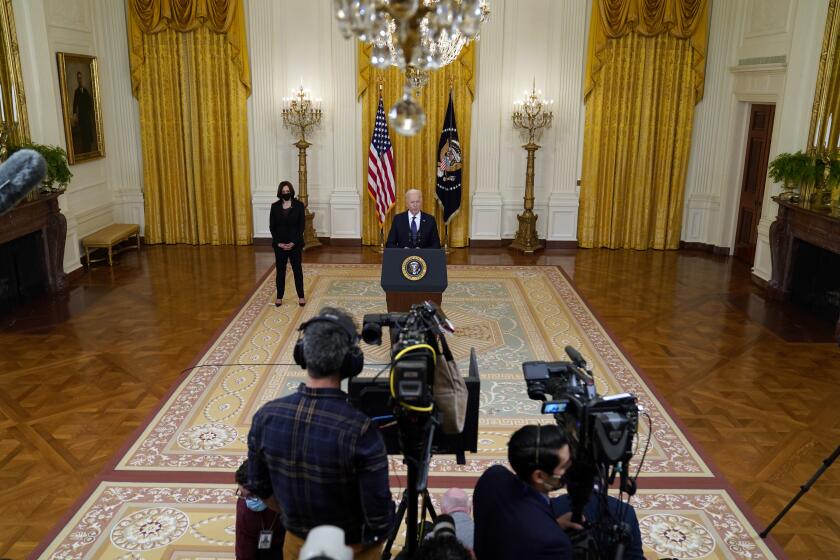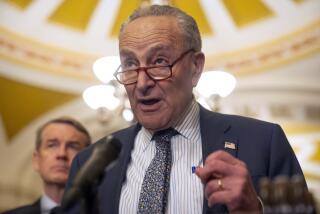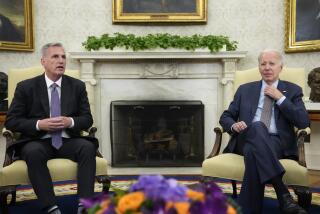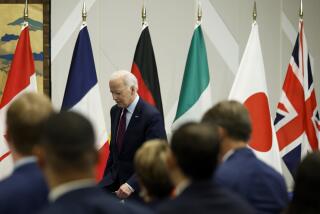Biden, Republican leaders build no bridges in White House infrastructure meeting
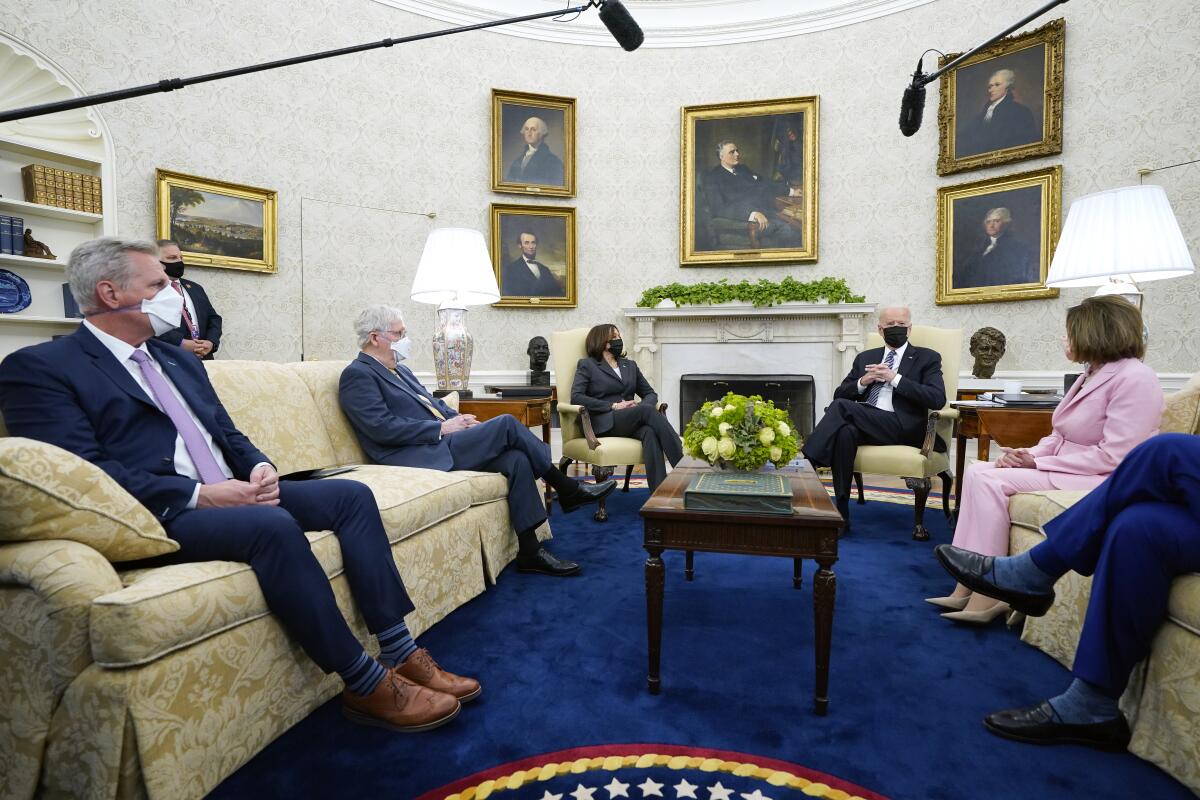
- Share via
WASHINGTON — President Biden’s first meeting with all four top congressional leaders ended with the usual platitudes on Wednesday — it was “productive,” “good,” “very strong,” and suggested “a place we can find bipartisanship.”
By today’s toxic standards in Washington, that’s something of an accomplishment. But it hardly means Biden has a clear path ahead in Congress for moving his agenda, most notably an expensive plan for investing in the country’s infrastructure and social services.
The two Republicans in the “Big Four,” Senate Minority Leader Mitch McConnell of Kentucky and House Minority Leader Kevin McCarthy of Bakersfield, said after the meeting that the president’s push to raise taxes on corporations and wealthy Americans was a nonstarter — their “red line” — and they criticized his plan for extending beyond what’s traditionally considered infrastructure projects.
President Biden will meet with Mitch McConnell, who’s ‘100%’ opposed to his agenda, and Kevin McCarthy, frontman for Republicans who question his election.
“We first have to start with the definition of what is infrastructure,” McCarthy told reporters outside the White House. “That’s not home health. That’s roads, bridges, highways, airports, broadband. Those are the places we can find common ground and work together.”
McConnell, who last week said he was “100%” committed to stopping Biden’s plans, emphasized that Republicans would not support reversing the corporate tax cut that they enacted more than three years ago. “We’re not interested in reopening the 2017 tax bill,” he said. “We both made that very clear to the president. That’s our red line.”
White House Press Secretary Jen Psaki, taking reporters’ questions as the Republican leaders were doing the same nearby, said Republicans were welcome to suggest other ways to fund Biden’s proposed $2.25 trillion in spending. “He’s proposed a way to pay for it,” she said. “We’ll see what other ideas they have.”
Biden, asked later about the meeting, said he came away “encouraged that there is room to have a compromise on a bipartisan bill that is solid and significant and a means by which to pay for it without dropping all of the burden on working-class and middle-class people.”
The president, who promised as a candidate that he would not increase taxes for people making less than $400,000 a year, drew his own red line. He emphasized his opposition to a Republican proposal to pay for infrastructure improvements through user fees, saying, “If everything is paid for by a user fee, the burden falls on working-class folks. This has to be a burden shared across the spectrum.”
The meeting lasted nearly two hours in the Oval Office. McConnell and McCarthy sat on one couch, and the two Democrats — House Speaker Nancy Pelosi of San Francisco and Senate Majority Leader Charles E. Schumer of New York — sat opposite them on the other. Biden and Vice President Kamala Harris occupied two chairs flanking the room’s fireplace.
The new president waited nearly four months to hold the meeting, a notably long time, especially given his campaign promise that he could restore some bipartisanship in Washington. In that time, however, he essentially has sought to redefine bipartisanship as extending beyond the capital, noting that polls show his proposals have support among Democrats, Republicans and independents.
The White House released a statement afterward summarizing the meeting, saying Biden “enjoyed hosting” the group and “expressed appreciation for the important priorities on which the parties had been able to work together so far, and that he wants to work diligently to build on those.”
The statement also underscored Biden’s oft-expressed point that his domestic agenda was also imperative for the nation’s international standing: “The president also emphasized that whatever differences exist between the parties, the real competition is between the United States and the rest of the world, and that other countries are not waiting for us to equip our people to win in the 21st Century — and that there is nothing we cannot do as a country when we do it together.”
Schumer was brief and circumspect in speaking to reporters after leaving the Oval Office. “We’ll see what areas of agreement and commonality there are,” he said. “That’s the first step.”
Pelosi did not speak publicly when the meeting ended, but her office later issued a statement calling the talks “constructive and encouraging.”
The prospect of a breakthrough seemed slim when the leaders gathered. Shortly before heading to the White House, McCarthy presided over the ouster of Rep. Liz Cheney (R-Wyo.) from his party caucus’ leadership team. Cheney had angered other Republicans by publicly and repeatedly denouncing former President Trump’s lies about his loss to Biden, and her downfall is a sign of how the former president remains the party’s dominant force despite his defeat and his ban from major social media platforms.
Asked about the ongoing lies about last year’s election, McCarthy brushed off the question with a falsehood of his own: “I don’t think anybody is questioning the legitimacy of the presidential election. I think that is all over with.”
“We’re sitting here with the president today,” McCarthy added.
Psaki said Biden wouldn’t let the controversy over Cheney derail his work on legislation. “The president is no stranger to working with people he disagrees with — or he has massive, fundamental disagreements with,” she said.
Biden’s negotiations with members of Congress extend beyond his meeting with the leaders. He spoke separately with key moderate Democrats earlier this week, including Sens. Joe Manchin of West Virginia and Kyrsten Sinema of Arizona, and he’s sitting down with some Republicans on Thursday, not for the first time.
The White House said Biden wanted to make progress on infrastructure legislation by Memorial Day so he could sign a bill this summer.
More to Read
Get the L.A. Times Politics newsletter
Deeply reported insights into legislation, politics and policy from Sacramento, Washington and beyond. In your inbox twice per week.
You may occasionally receive promotional content from the Los Angeles Times.
